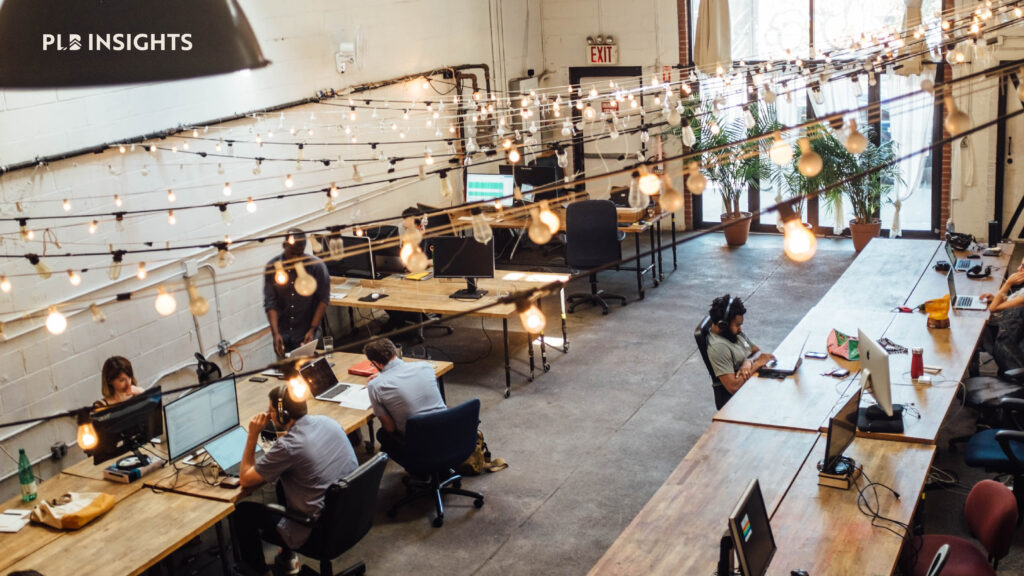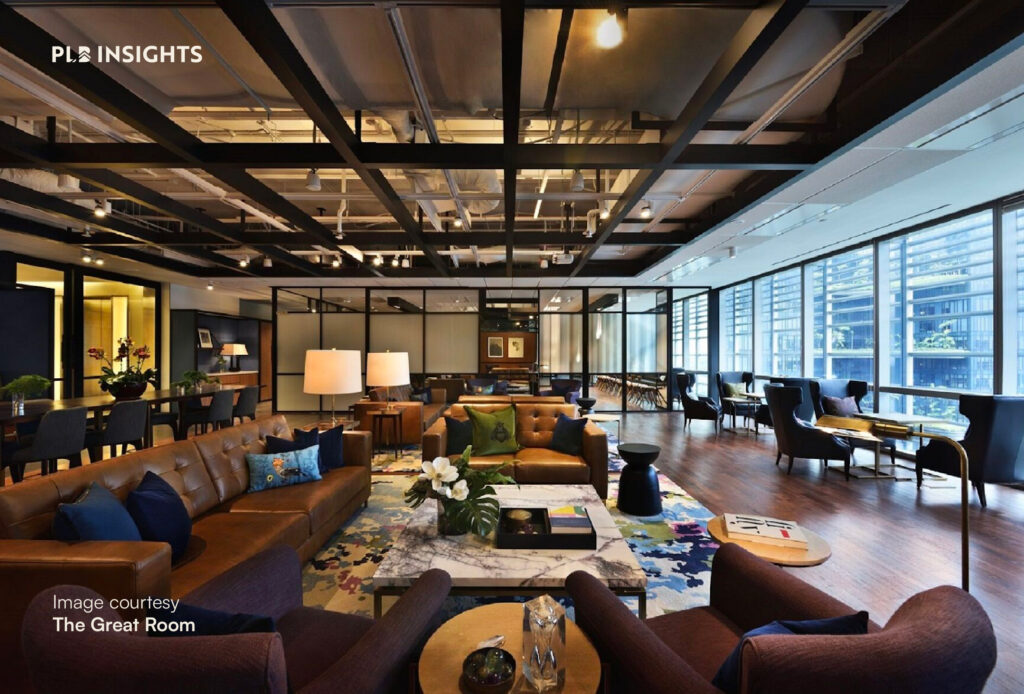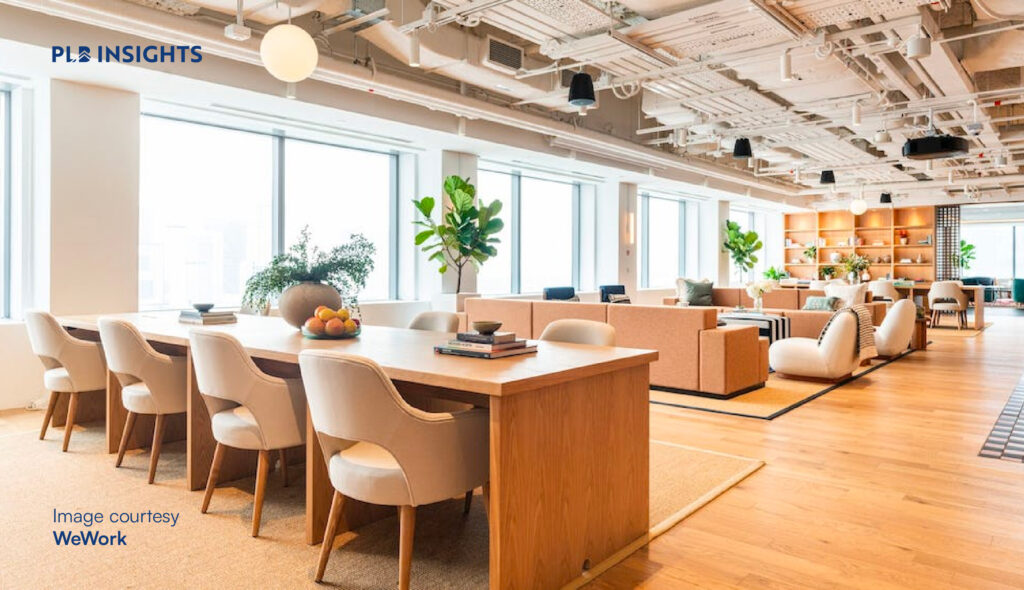
Co-working spaces in Singapore are thriving again, despite being deemed as a fad when they first popped up. From coworking giant WeWork and JustCo to family-oriented Trehaus, the options are now endless. What started as a place for tech startups to house their team has evolved into a free-for-all working space for anyone interested.
While demand plummeted during the Covid-19 pandemic, signs point towards a healthy growth in occupancy rates in the coming years. Ironically, it is also due to the pandemic that remote work became the norm and is a viable option even to the current day, contributing to the demand for co-working spaces from individuals and companies.
Is this signalling a shift from traditional office spaces?
Current Climate
After a period of reduced activity during the Covid-19 pandemic, co-working spaces are now experiencing a resurgence. This growth is primarily driven by the increasing demand for flexible work arrangements, particularly from start-ups with limited resources and smaller teams. These businesses are drawn to co-working spaces due to the convenience and flexibility they provide. However, there are those who have expressed apprehension regarding the escalating costs associated with co-working spaces.
The occupancy rate at co-working spaces in Singapore has experienced a significant recovery, increasing from an average of 50-60% during the pandemic to 80-90% by the third quarter of 2022. Singapore currently boasts 176 co-working spaces, covering an estimated area of nearly 4 million square feet as of Q3 2023, accounting for approximately 5% of the total office space available in Singapore.
This figure represents one of the highest shares in the Asia Pacific region, according to research conducted by CBRE. The co-working industry in Singapore has witnessed exponential growth over the past decade, with the number of co-working spaces rising from 85 in 2013 to its current count. During this period, the estimated footprint of these spaces has expanded from 820,000 square feet to its current size. Property experts anticipate that the co-working market will continue to expand, albeit at a similar or slower pace in the future.
Case Studies
The Great Room

If we look at the co-working operators, many of them express optimism for the next year. The Great Room offers day pass services for anyone to drop in and hot-desk for the day beyond the usual offerings for companies and long-term memberships. The occupancy rates of The Great Room have increased significantly from an average of 90% pre-pandemic to 95-100% in 2023 across all six locations. The establishment has also introduced a range of new amenities for its 3000-strong tenant base, including complimentary breakfast on Mondays, nursing rooms, and a podcast studio.
Since 2019, The Great Room has recorded an impressive year-on-year growth of 30%. The monthly charges range between $750 and $1300, depending on whether tenants opt for credits for meeting rooms and hot desks or dedicated offices.
WeWork

WeWork opened its doors in Singapore at Beach Road in 2018, which was also the first office in the Southeast Asia region. As a widely known brand, many companies that have their own offices set up shop in WeWork locations as a means to network among other startups and companies. WeWork’s presence in Singapore encompasses 14 locations, with its most expansive establishment in the APAC region being unveiled in September 2022. Spanning an impressive 213,000 square feet across 21 floors, this remarkable space is situated at 21 Collyer Quay.
The surge in demand for flexible work arrangements following the Covid-19 pandemic has resulted in a notable rise in the number of pay-as-you-go users. In fact, during the first quarter of 2023, this user segment experienced a doubling in numbers compared to the corresponding period in 2022. Furthermore, the market of pay-per-month users also witnessed substantial growth, with a remarkable 28% increase during the first quarter of 2023 when compared to the same period in 2022.
Why is the Demand still Strong?
The current demand for co-working spaces has been amplified by the supply chain delays that the world is experiencing, particularly from companies that are expanding and recruiting. It is worth noting that a traditional office may require up to 18 months to locate and set up a suitable workspace. Therefore, there is an urgent need for space among growing businesses. Additionally, since the pandemic, some companies are realising the benefits of remote working as a means to trim budgets. Many faced uncertainty with their office leases with the pandemic, with no headcounts in office. Hence, paying a smaller sum for a dedicated office in co-working spaces only for meetings or dedicated in-office days could be a viable option as well. The beauty of co-working spaces is also the ability to network with different companies and leaders. WeWork allows both members and non-members to hold events in their communal spaces as a means for members to gather and potentially increase brand awareness. This is especially crucial for startups looking for collaborations or networking opportunities.
Downsides of Co-working Spaces
The news of WeWork declaring bankruptcy has also rocked the boat in the co-working landscape. Once valued at $47 billion USD in 2019, the company once lauded as the most valuable startup in the USA may have to shutter some of its offices in the US and Canada. While its declaration of bankruptcy does not affect its offices in Singapore, it is still a cause for concern on the sustainability of co-working spaces. At the core of its business, co-working spaces are in the real estate industry. Hence they are still dependent on people paying for their spaces in order to stay afloat and afford their own leases.
Closing Thoughts
Due to the availability of remote working options, companies are increasingly seeking flexible office spaces as a cost-saving measure for rental leases, given the underutilisation of traditional fixed spaces. The co-working industry in Singapore has undergone a significant transformation from a niche concept to a thriving sector that caters to a diverse range of businesses and professionals.
Despite the challenges posed by the Covid-19 pandemic, the demand for flexible work arrangements and the convenience of co-working spaces has led to a resurgence in occupancy rates. While co-working spaces have proven their value, their long-term viability may depend on adapting to changing market conditions and evolving business models.
If you are looking for commercial spaces for your business needs, contact us here and let our consultants help you.







